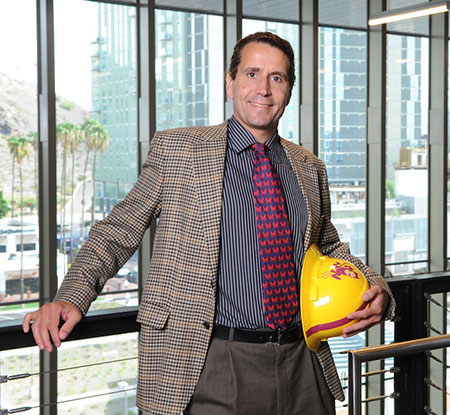Awards spotlight creative teaching, high-impact research

As an educator, David Grau has developed and implemented innovative instruction strategies. As a researcher, he is providing the construction industry improved methods for cost-effectively planning and managing projects. Photo by Jessica Hochreiter/ASU
David Grau has been named the Construction Industry Institute’s 2017 Outstanding Instructor and Outstanding Researcher.
The awards recognize the assistant professor of construction management and engineering in Arizona State University’s Ira A. Fulton Schools of Engineering not only for his teaching but also for developing creative instructional methods, his service as a mentor to students and the contributions of high-impact research to the construction professions.
Grau came to ASU in 2013 with more than a decade of industry experience in design and construction coordination, along with experience in industrial, systems and computer engineering.
Those qualifications “make him unique in the field of construction engineering and enable him to develop and implement innovative and particularly effective instruction strategies,” wrote Professor G. Edward Gibson Jr. in nominating Grau for the CII teaching award.
“David adopts an active learning strategy in his instruction,” Gibson wrote of Grau, “so that students learn by applying, analyzing, collecting, touching, playing, observing and collaborating, as opposed to passively listening in the classroom.”
Grau teaches in the Del E. Webb School of Construction, a part of the School of Sustainable Engineering and the Built Environment, for which Gibson is the director. It is one of the six Fulton Schools of Engineering.
He is also on the faculty of ASU’s Barrett, the Honors College and is a senior sustainability scientist with ASU’s Julie Ann Wrigley Global Institute of Sustainability.
Grau teaches a variety of undergraduate and graduate courses, including Building Construction Methods, Materials and Equipment, Construction Productivity, Construction Industry Best Practices and Research Methods.
Gibson points out that Grau has developed all of the materials and teaching strategies for the Construction Productivity course, using information from CII publications and teaching tools from two CII research teams.

David Grau will be formally presented the Outstanding Instructor and Outstanding Researcher awards on Aug. 1 at the CII Annual Conference in Orlando, Florida. Photo by Tim Trumble
Through that course Grau is also introducing students to the industry’s evolving concept of “constructability,” which focuses on the importance of incorporating construction expertise into the early design stages of construction projects.
“Students learn what constructability is, and what the benefits from its effective implementation are,” Gibson wrote.
Outside of the classroom, Grau is the faculty adviser to the ASU student chapter of Engineers Without Borders, which aids disadvantaged communities through engineering projects, and he mentors students who are embarking on their first forays into research through the Fulton Undergraduate Research Initiative.
Grau is also making an impact with his research efforts. He is “at the forefront” of applying computer and systems engineering to civil and construction engineering practices, according to Gibson.
He notes that Grau is particularly well known for envisioning and implementing advanced radio-frequency identification tracking systems being used by construction organizations throughout much of the world.
The CII is recognizing him with its Outstanding Researcher award for his achievement as the principal investigator on the project “Improving the Accuracy and Timeliness of Project Outcome Predictions,” conducted in 2013.
That effort, according to the CII’s award judges, has since proven to have successfully identified that barriers to making accurate predictions relating to costs, management, scheduling and performance of construction projects stem mostly from “organizational behavior factors” rather than from faulty forecasting algorithms and numerical methods.
Grau was nominated for the researcher award by Professor Edward Back, head of the University of Alabama’s Department of Civil, Construction and Environmental Engineering.
Back wrote that the work by Grau and his research team managed to not only “assess and quantify the importance of predictability, but also explained the cause-and-effect processes underlying the endemic inability to predict early in the project delivery process.”
He emphasized that the research resulted in the development of two tools — a Predictability Index and a “Four-Casting” assessment of the construction management process — that ensure more accurate project predictions through proactive rather than reactive forecasting and assessment practices.
The CII is a nonprofit consortium of more than 130 leading owner, engineering-contractor and supplier firms from both the public and private sectors.
“It is a true honor to be the recipient of this prestigious and competitive CII award,” Grau says. “It brings a high level of recognition from leading owner and contractor organizations in the U.S. and abroad.”
He credits much of his professional achievement to the guidance of “my current and past mentors” and to the Fulton Schools leadership for “their unconditional support to advance my research and instruction experience, knowledge and skills.”
Grau will be formally presented the Outstanding Instructor and Outstanding Researcher awards on Aug. 1 at the CII Annual Conference in Orlando, Florida.
More Science and technology
From wannabe high school math teacher to Regents Professor
It’s a bit difficult to describe the work Stephanie Forrest does as director of Arizona State University’s Biodesign Center for…
Regents Professor recognized as pioneer in educational technology
Reading can transport people around the world — and back and forth in time.That’s what Danielle McNamara has helped tens of…

Professor’s expertise in technology transfer leads to top faculty honor
Universities spend billions of dollars on research, and the process of transforming that work into goods and services for the…